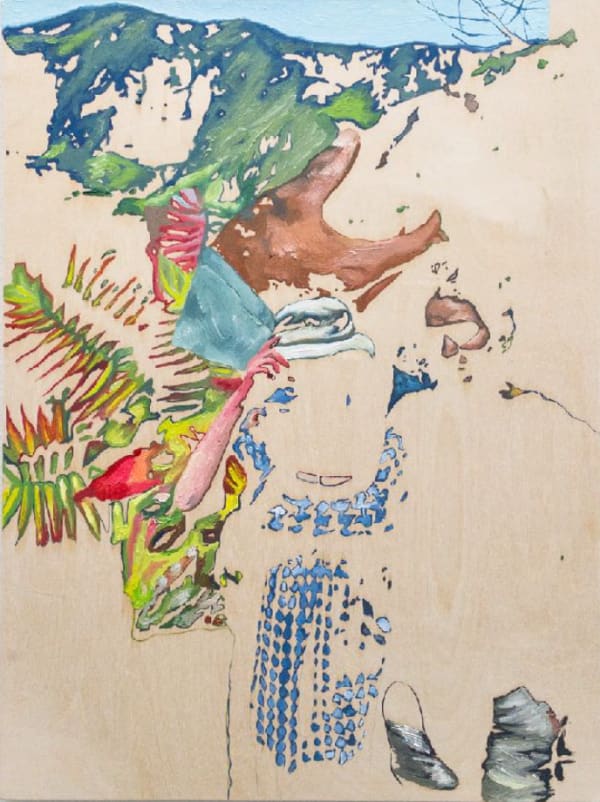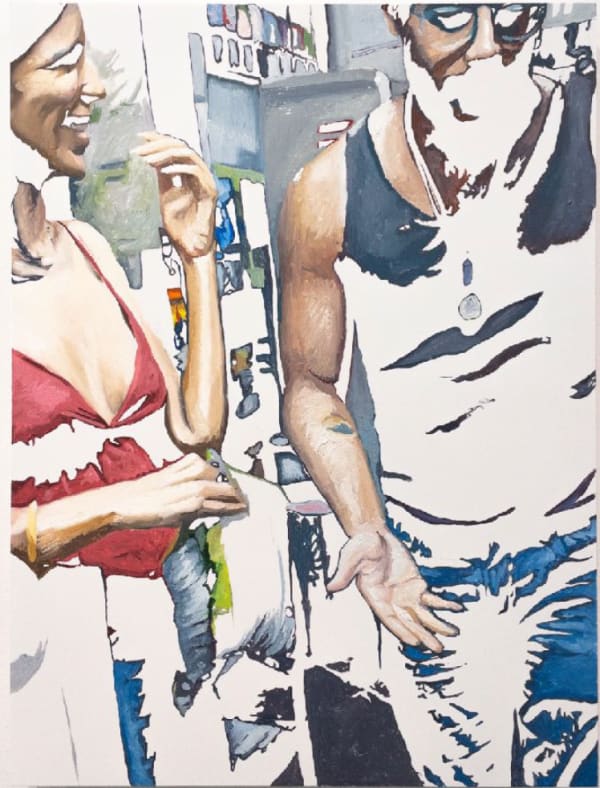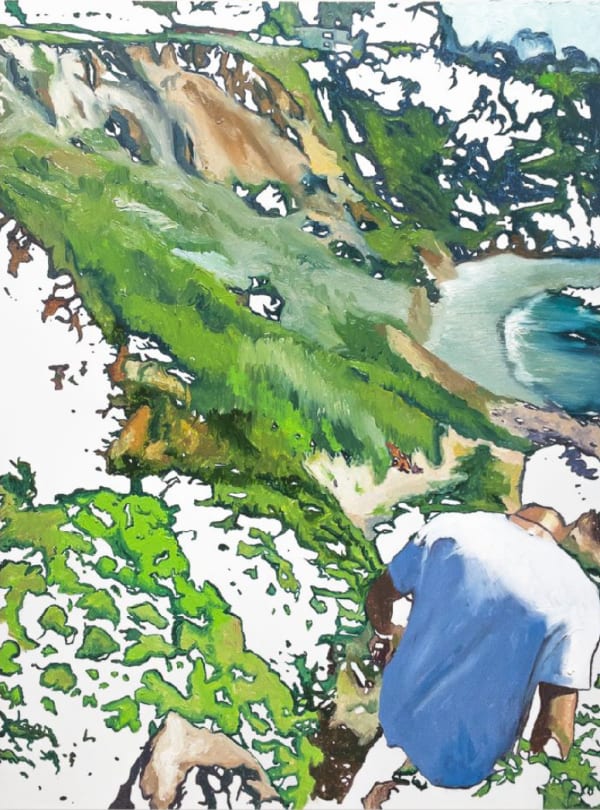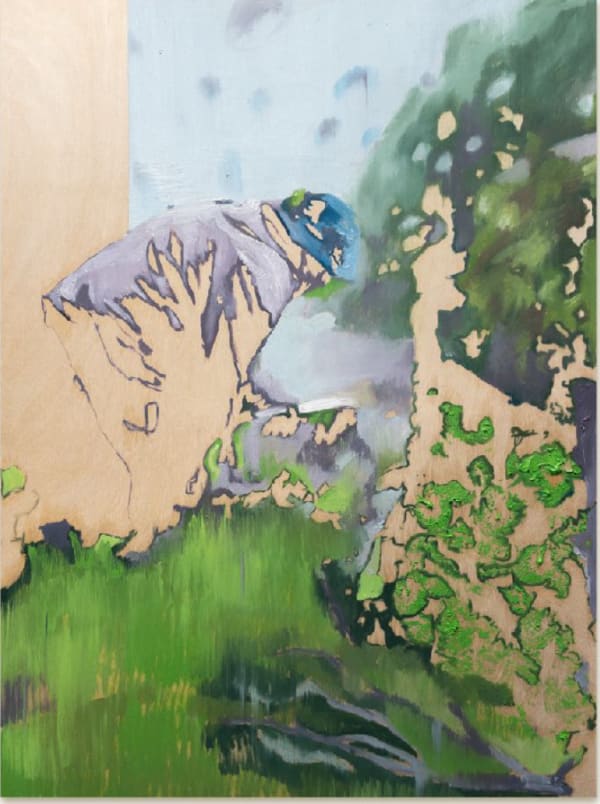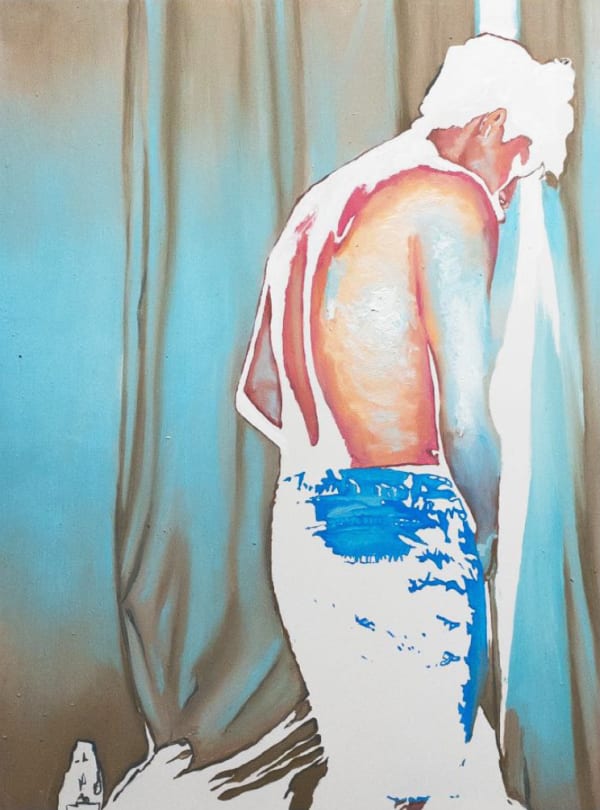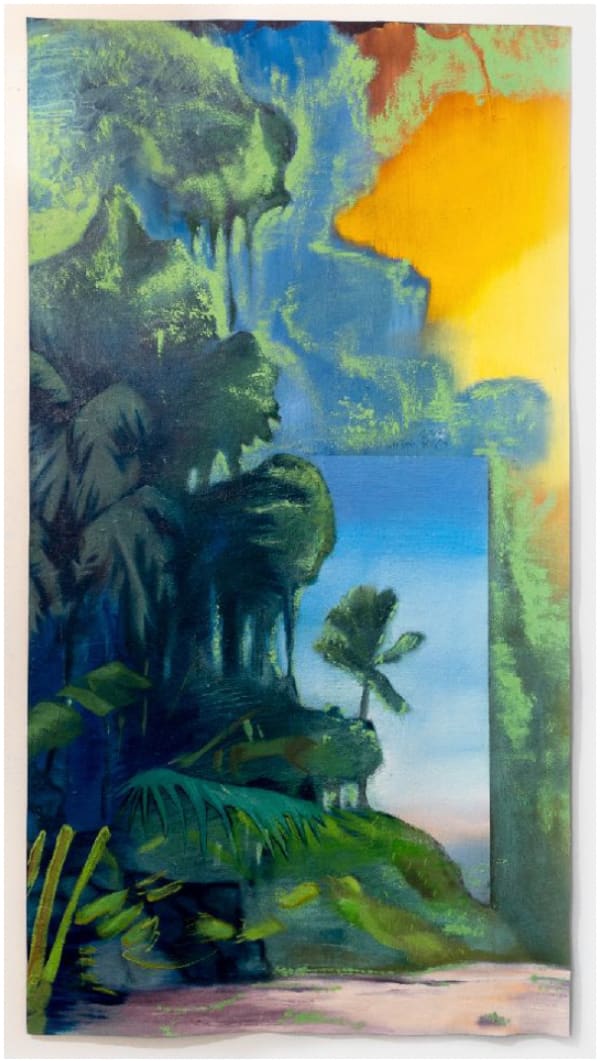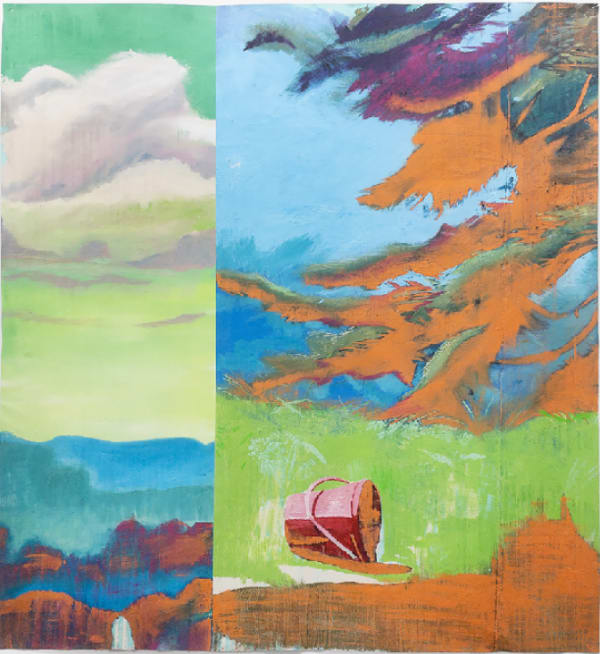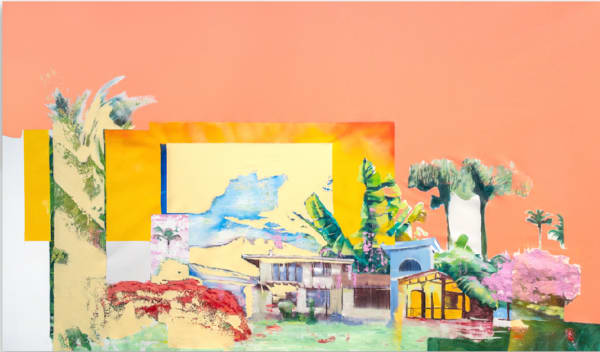TROPISMO DEL PAISAJE: JOAQUÍN STACEY-CALLE
Past exhibition
Press release
MEY is pleased to present Tropismo Del Paisaje (Entre Sierra, Pantano, y Desierto), a solo exhibition of recent work by Los Angeles based artist Joaquín Stacey-Calle.
Joaquín’s artistic process begins with sourcing imagery from the large collection of family photographs taken by his father. Digitally layering and manipulating these images, the artist then renders them in oil and spray paint on materials such as drop cloth, wood, and canvas. Painted in a softness reminiscent of film photography and animation, and abstracted by geometric lines and blank spaces, these representations visualize the impending transience of memory. Rooted in his personal experiences of migration, the presented paintings and installations investigate how natural and constructed environments inform identity and inspire resistance.
Translating to Landscape Tropism (Between Sierra, Swamp, and Desert), the exhibition’s title is more than a reference to the tropical settings of the artist’s paintings. Tropism—the phenomenon of an organism responding to its external stimuli—is both materially and conceptually integral to Joaquín’s practice. Invested in how people respond to their surroundings and how landscapes respond to the people that inhabit them, Joaquín primarily explores life in the lush terrain of his three homes—Ecuador, Miami, and Los Angeles.
A quintessential aspect of these environments is their shared vegetation. Works like Digesting landscapes 3 (2023) feature the Fan Palms, Banana Trees, and Eucalyptus plants that are enmeshed into Joaquín’s aesthetic vocabulary. Harkening back to nineteenth century American painters like Frederic Church and Louis Rémy Mignot, Joaquín’s paintings engage with historical representations of South America. In Tropismo Del Paisaje, colonial renderings of idealized exoticism are replaced with warm recollections of personal and collective experience.
A quintessential aspect of these environments is their shared vegetation. Works like Digesting landscapes 3 (2023) feature the Fan Palms, Banana Trees, and Eucalyptus plants that are enmeshed into Joaquín’s aesthetic vocabulary. Harkening back to nineteenth century American painters like Frederic Church and Louis Rémy Mignot, Joaquín’s paintings engage with historical representations of South America. In Tropismo Del Paisaje, colonial renderings of idealized exoticism are replaced with warm recollections of personal and collective experience.
Equally essential to the paradisiacal and domestic settings of Joaquín’s paintings are the people. Often family and friends, these figures are depicted trekking mountainous terrain—as in Controlled decay (intimacy of strangers) 12 (2023)—and gathering around tables—as in La Arquitectura del Hogar (2023). The significance of domestic objects to Joaquín’s practice is highlighted in pieces such as Untitled (abuelo) (2023), a portrait of the artist’s grandfather painted on a plastic table cover. Foodstuffs are an integral part of Joaquín’s oeuvre as well; in his installation Archives of desire (polyculturing monocultures) (2023), organic material becomes medium. In this work, fermenting fruits and vegetables become symbols of decomposition, decolonization, regrowth, and cultivation.
Works
-
 Joaquín Stacey-CalleControlled decay (intimacy of strangers) 1, 2023Oil on wood20 x 18 in
Joaquín Stacey-CalleControlled decay (intimacy of strangers) 1, 2023Oil on wood20 x 18 in -
 Joaquín Stacey-CalleControlled decay (intimacy of strangers) 11, 2023Oil on wood20 x 18 in
Joaquín Stacey-CalleControlled decay (intimacy of strangers) 11, 2023Oil on wood20 x 18 in -
 Joaquín Stacey-CalleControlled decay (intimacy of strangers) 12, 2023Oil on wood20 x 18 in
Joaquín Stacey-CalleControlled decay (intimacy of strangers) 12, 2023Oil on wood20 x 18 in -
 Joaquín Stacey-CalleControlled decay (intimacy of strangers) 2, 2023Oil on wood
Joaquín Stacey-CalleControlled decay (intimacy of strangers) 2, 2023Oil on wood
24 x 18 in -
 Joaquín Stacey-CalleControlled decay (intimacy of strangers) 8, 2023Oil on wood20 x 18 in
Joaquín Stacey-CalleControlled decay (intimacy of strangers) 8, 2023Oil on wood20 x 18 in -
 Joaquín Stacey-CalleDigested landscapes, 2023Oil and latex on drop cloth
Joaquín Stacey-CalleDigested landscapes, 2023Oil and latex on drop cloth
71 x 100 in -
 Joaquín Stacey-CalleDigested postcard #1,, 2023Oil and latex on drop cloth
Joaquín Stacey-CalleDigested postcard #1,, 2023Oil and latex on drop cloth
35 x 92 in -
 Joaquín Stacey-CalleDigesting landscapes 3 (Verde que susurra), 2023Oil and latex on drop cloth71 x 49 in
Joaquín Stacey-CalleDigesting landscapes 3 (Verde que susurra), 2023Oil and latex on drop cloth71 x 49 in -
 Joaquín Stacey-CalleDigesting landscapes 4 (El sol timido), 2023Oil and latex on drop cloth47 x 25
Joaquín Stacey-CalleDigesting landscapes 4 (El sol timido), 2023Oil and latex on drop cloth47 x 25 -
 Joaquín Stacey-CalleDigesting landscapes 5, 2023Oil and latex on drop cloth
Joaquín Stacey-CalleDigesting landscapes 5, 2023Oil and latex on drop cloth
79 x 73 in -
 Joaquín Stacey-CalleHogar, 2022Oil on latex on canvas62 x 90 in
Joaquín Stacey-CalleHogar, 2022Oil on latex on canvas62 x 90 in -
 Joaquín Stacey-CalleHogares (?) 7, 2022Oil and spray paint on canvas
Joaquín Stacey-CalleHogares (?) 7, 2022Oil and spray paint on canvas
50 x 64 in -
 Joaquín Stacey-CalleLa Arquitectura del Hogar, 2022Oil and latex on drop cloth85 x 48
Joaquín Stacey-CalleLa Arquitectura del Hogar, 2022Oil and latex on drop cloth85 x 48 -
 Joaquín Stacey-CalleLa Arquitectura del Hogar, 2022Oil and spray paint on canvas
Joaquín Stacey-CalleLa Arquitectura del Hogar, 2022Oil and spray paint on canvas
64 x 72 in
Installation Views
